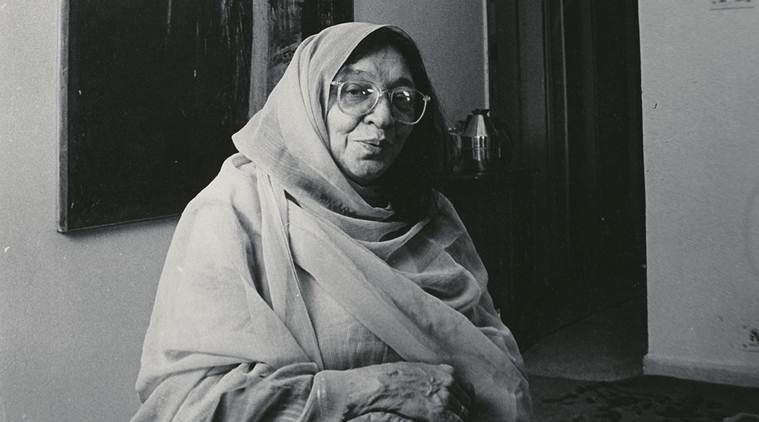Written by Alok Rai |Updated: March 23, 2019 12:38:43 am
Forgetting partition, remembering partition
This memoir of a displaced person is not Krishna Sobti’s finest work, but it reminds us that ironically, the business of Partition is, indeed, unfinished and ongoing

Book: A Gujarat Here, A Gujarat There
Writer: Krishna Sobti (Translated by Daisy Rockwell)
Publication: Penguin Hamish Hamilton
Page: 272
Price: Rs 499
The death of Krishna Sobti in January marks the passing of practically an entire generation of Hindi greats: Kunwar Narain, Kedarnath Singh, Namwar Singh, Sobti herself… That elision is ominous, for who can (or will) follow that? But even in this august company, Krishna Sobti was an unusual — and, be it said, even unaugust — figure. She was eccentric and unconventional, she was frequently outrageous, she could be tender, her experimental and even salty language severely tested (and breached) the limits of Hindi propriety. And in choosing to translate A Gujarat Here, A Gujarat There, Daisy Rockwell has set herself a formidable challenge.
Macho politicians on both sides of the border — broad chests, epic phalli — snarl a particular phrase at each other. Both hint darkly at “the unfinished business of Partition”. When Pakistanis speak of the unfinished business of Partition, they mean the as-yet-incomplete takeover of Kashmir. But when saffron-tainted Indians speak of “the unfinished business”, it is not entirely clear what they mean — retaking all of Kashmir, but magically emptied of all Kashmiris? But there is also lurking there the thought of “somehow” sending away 120 million Indian Muslims, most of whom were born after Partition, oddly, “back” to Pakistan. Along with the people who point out the obvious stupidity of this argument. (Then there is “akhand Bharat”, which is a hybrid of revanchism and genocide.)

However, there is another sense in which the (experience of) Partition is unfinished business — indeed, it is business that has barely begun to be addressed. Radioactive substances don’t cease to be active if they are ignored, or forgotten, or even buried in concrete, as at Chernobyl. It is precisely when they are left unattended that they are most dangerous. That is why the truth and reconciliation process — the somewhat melodramatic and lugubrious enunciation of past horrors — is an essential part of the way in which post-traumatic societies seek to achieve a measure of normalcy.
But Partition remains practically a taboo subject in our public discourse. Many years ago, when the TV serial Tamas, based on Bhisham Sahni’s novel, was aired, there were howls of protest about reviving painful memories, reopening old wounds, etc. Nonsense, of course — guilty, culpable nonsense! Those wounds are festering, and the stench is becoming overpowering. The murderers of Partition walk in our midst, our public life is haunted by the ghosts of Partition.
In that sense, I suggest, we are all victims of Partition — victims of the unacknowledged Partition, victims of the ongoing Partition. But Krishna Sobti was a victim of Partition in a more direct sense. She was a displaced person herself, she had known violence among her own family and friends. And though she did not choose to write standard Partition fiction — the trains filled with bodies, the wells choked with the corpses of still-honourable women — the shadow of Partition is inescapable in much of what she wrote, if only in the evocation of prelapsarian Punjab, and even Delhi.
The shadow of Partition falls on the present book as well. This is an odd, eccentric novella-cum-memoir of a young woman in the immediate aftermath of Partition, seeking to make a career in the small princely state of Sirohi, on the ambiguous border between Rajasthan and Gujarat. That is the first Gujarat — “here” — in the title. The second is the Gujarat that she has come from, in Sind, Pakistan, “there”. But beyond that, and sundry unelaborated references to the dislocation and violence of Partition, there is only the carefully observed trivia of aristocratic, feudal living: princelings, dowagers, servile servants, endlessly scheming officials. And a young woman — Sobti herself? — passing through, noticing, and noting. But oddly, not adding up to very much more than the ironic opening up, as a consequence of the dislocation, of the possibility of her freedom from traditional constraints — a dream of economic independence, in the aftermath of tragedy.
In general, this is not a very remarkable book — certainly nowhere near Sobti’s finest. Indeed, I can’t help feeling that Daisy Rockwell’s translational energies could have been better deployed elsewhere, can’t help feeling that some other Sobti text should have been the object of such obituary recall. But what is remarkable even here is the manner in which the “Gujarat” of the title has become a symbolically freighted sign, almost disjunct from the place where ordinary people must live ordinary lives. But for us today, the many meanings of Gujarat have been sucked into the black hole of 2002 — along with Sobti’s innocent novella. The haunted house in which the heroine takes up residence is the haunted land in which we all live, on this our darkling plain.
For all the apparently distracted obliquity of her text, Sobti’s polemical thrust is still unmistakable. Seeking to distance
herself from the pettiness around her, the heroine remarks:
“What sort of place is this?… The country has just become free and all sorts of fights are breaking out in the name of Brahmins, Baniyas, Rajputs and Kshatriyas…
For some reason she felt a kind of rage bubbling up inside her. What is this backwardness, this lack of education? Why did Partition even happen? Here they have problems between Baniyas, Brahmins and Rajputs — there it was Hindus and Muslims.
Was. Is.”
As parting lines go, that’s not half bad. Was. Is.
The writer taught in the department of English, Delhi University






















No hay comentarios:
Publicar un comentario